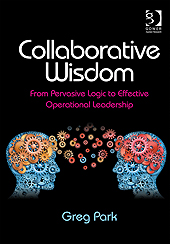
08/15 – Greg Park, Collaborative Wisdom: From Pervasive Logic to Effective Operational Leadership
blank
 Greg Park, Collaborative Wisdom: From Pervasive Logic to Effective Operational Leadership. Burlington, VT: Gower, 2013.
Greg Park, Collaborative Wisdom: From Pervasive Logic to Effective Operational Leadership. Burlington, VT: Gower, 2013.
It seems relatively rare to come across a truly thoughtful work on operational leadership. It seems that most writers romanticize leadership as something that occurs at the top of a team, an organization, a company, a country, any human system. The tendency is to perpetuate an heroic notion of leadership, a notion that has enough grounding in fact to attract our attention, but insufficient meaning in the face of systems complexity to do more than obfuscate the dynamics of leadership and the activities of those who move in and out of leader roles
Park’s guiding concept is wisdom presented in a way that is intended to change mindsets and perspectives; it is meant to be absorbed, rather than learned, says Park. This is a refreshing step away from the formulaic material that generally passes for leader education and training. This is “a practically wise, pragmatic, hard-headed, operational business leadership.” Practical and collaborative wisdom is” relevant, indeed critical in the realization of effective operational leadership.” It is clear that leadership must include the collective of the organization, as well as stakeholders. Park’s approach is not to offer a recipe, but a compass, thus recognizing the importance of contextual variables in determining what is effective individually and collectively. Context is important because operations occur in the face of chaos and confusion. Park advocates the application of a set of values, principles, perspectives and priorities, rather than “best practices” derived from other contexts. Wisdom is present when it is recognized that each situation does not meet the implied requirements, but optimizes them.
Park states, “[Un]like other areas of expertise operational people management is less about principles, standards and practices, and more about perspectives, attitudes, characteristics, attributes and capabilities.” Thus he lands square in the upper left quadrant of the AQAL model. Furthermore, he suggests that no matter how well the business is managed, effectiveness relies on leadership at the individual and collective levels. Expert leadership is far more complex that functional expertise; it cannot be taught, but must be development over time through engagement with the organization and the application of critical reasoning. This requires a “dominant logic” results in ineffective operations. This logic must be communicated and be based on “values and principles which foster effective people leadership, whilst proactively developing leadership attributes and capabilities…”
The author seems to be aware of distinctions between managing and leading, but still sees leading as a “directing” role. “I am increasingly bemused to find that the higher that one looks within an organizations leadership hierarchy the less one sees individuals with capabilities in and a focus on people management.” Consequently, leadership is to be found throughout an organization, not just it’s top echelons.
His focus on wisdom is of the practical and collaborative sort that is essential to work with the chaotic nature of operational efforts in organizations. No matter the level of the organization he sees leadership as an heroic act, albeit performed by multiple individuals at various times. The current dominant logic of leadership needs to be shifted through the application of practical wisdom, Aristotle’s Phronesis:
[S]ound judgement and wisdom when deciding on actions to resolve practical operational day to day issues. Phroesis requires consideration of all aspects of knowledge, experience, insight and intuition, taking into consideration both rational and emotional consideration in coming to any single decision.
With this as a foundation the book covers several foci: developing credibility and trust, practically wise operational leadership and its imperatives before shifting to a global leadership context. An interesting aspect of this is the linking of operational leadership to philosophy, religion and universal values. The latter encourages would-be leaders to use a univeralist perspective when solving problems, thereby creating long term value through an organization. Park sees a direct link between “established philosophy,” on the one hand, and perspectives, practices and priorities of business leadership, on the other.
While contextual differences contribute to diverse approaches to effectiveness, there are universal human requirements (I am reminded of the work of SAM Harris), such as survival requirements, social interaction, and institutions to support and protect community security, survival well-being and development. He identifies motivational values domains: presocial/benevolence, restrictive conformity, tradition, security, achievement, power, maturing/universalism, self-direction, stimulation and enjoyment.
This brief review is already getting too long. At this point suffice it to say that this book represents an expansive approach to a very hardcore issue in business – operational leadership. I read this book with hope, hope for the future of our collective thinking and action in relation to organized human systems. I believe it represents the kind of thinking and perspectives on development that is ready to consider the richness offered by integral and developmental approaches.
